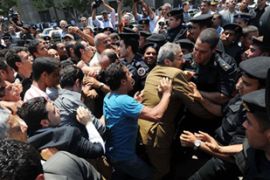Egypt’s state of emergency extended
Law granting extensive police powers to be used only for “terrorism” and drug cases.

“The emergency law will not be used to undermine freedoms or infringe upon rights if these two threats are not involved,” Ahmed Nazif, the Egyptian prime minister, said during his speechto parliament.
Al Jazeera’s Amr el-Kahky, reporting from Cairo, said that the changes to the emergency law were “significant indeed”.
“The opposition, during telephone calls with me earlier, described it as half a step towards democracy,” he said.
“The law has been in place continuously since 1967 apart from 18 months between 1980 and 1981, which means the country has been living under the emergency law for a very, very long time.”
The state of emergency has previously been renewed every three years since 1981.
Law opposed
Abdullah al-Ashaal, a presidential candidate and professor at the American University in Cairo, told Al Jazeera that the government should lift the law totally and not go around the issue by choosing to apply it selectively.
| EMERGENCY LAW | |||||||||||||
|
“The national movement is pressing them to lift this law of emergency which is a scandal for Egypt and a shame for the government,” al-Ashaal said.
He said that Egypt does not have any terrorism: “I think the terrorism is from the government for neglecting the needs of the people and not serving the national interests. This intensifies the tensions in Egypt.
“And if any terrorism arises, it is because of the government policies – raising prices, the detention of people and the injustices which are prevailing everywhere,” the former aide to the foreign minister and ambassador to Saudi Arabia said.
“We are insisting that this law is totally lifted and that the government apologises to the Egyptian people for this.”
Demonstrators also protested outside the Egyptian parliament on Tuesday. A number of protesters were injured after a similar rally in downtown Cairo earlier this month.
Opposition parties, including the National Association for Change of former UN atomic energy agency chief Mohamed ElBaradei, have demanded an end to the emergency law in the run-up to parliamentary elections this year and a presidential vote in 2011.
The emergency law has been in place continuously since Anwar Sadat, the former Egyptian president, was assassinated in October 1981.
Changes promised
Hosni Mubarak, the Egyptian president, has promised repeatedly to overturn the law.
 |
| Mubarak has repeatedly suggested that the emergency law will be replaced [AFP] |
During his 2005 re-election campaign, Mubarak said he would replace it with a new anti-terrorism law, but that bill was never passed and Mubarak used that fact to justify renewing the emergency law.
Officials from the ruling National Democratic Party promised once again this weekto pass anti-terrorism legislation. The NDP says that law, if passed, would allow for the phasing out the remaining sections of the emergency law.
The emergency law gives police and security officials broad authority to break up public demonstrations, detain people without charges or evidence, and conduct searches without judicial approval.
A special emergency security court was also established under the law. Its rulings are not subject to normal judicial review, and can only be overturned by the president.
Human rights organisations have long been critical of the legislation.
The Cairo-based Egyptian Organisation for Human Rights called it earlier this week “the main source of human rights violations in Egypt”.
